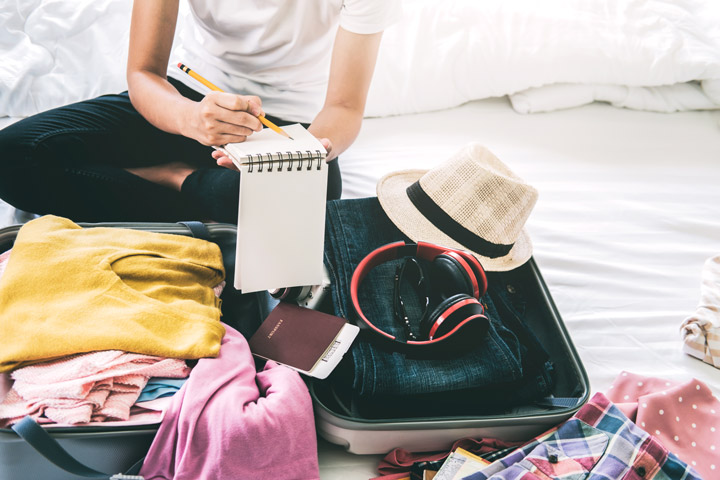
You’ve been offered the chance to live and Move Abroad and experience a once-in-a-lifetime adventure after weeks, months, or even years of devotion, hard work, and patience.
The anxieties have started to creep in after you’ve shared the extremely joyful news with everyone. As exciting as it is to pack your belongings and relocate halfway around the world, the logistics — the preparation — may be hard and stressful.
However, if you start planning ahead of time, you’ll find the entire procedure to be doable. To help you get started, we’ve compiled a list of steps that every aspiring ex-pat should follow before departing, no matter where they’re going or how long the journey will be.
Consider how much it costs to relocate across the United States. Consider how much it will cost to transport you to the other side of the world! The visa application, aircraft tickets, overseas shipments, lodging, and emergency are only a few of the expenses.
When going overseas, the old adage of having six months’ worth of funds is sound advice — and it should be a minimum. We also recommend doing some research on the exchange rate and the cost of living in your new location, as well as creating a monthly budget plan. During the first several months, expect to incur unexpected expenses.
Check the official website of your new nation to discover what supporting documents you’ll need to submit with your application, which may vary based on the visa. For example, if you’re applying for a student visa in the United Kingdom, you’ll need to submit a copy of your university’s offer letter as well as proof that you’ll be able to support yourself throughout your studies. You may also need to make an appointment to submit your biometrics at a Department of Homeland Security application assistance center.
You must have a valid passport in order to apply for a visa. Some countries demand that you travel with a passport that is valid for at least six months beyond your intended departure date. If your passport expires while you’re overseas and you don’t have a specific return date, you can renew it at your local US Embassy or consulate-general.

When you reside in another country, you will certainly come into contact with the healthcare system. Check with your current healthcare provider to see whether they will cover you while you are away. Request medical records from your doctor and make sure you’re up to date on all of your vaccines. Here’s where you can find out which ones you’ll need. You’ll also need to find out if your prescription drugs are legal in the country, and if they are easy to obtain. If not, plan on bringing a backup supply on your vacation.
The US Embassy in the country where you will be residing gives a list of physicians and hospitals. In the “U.S. Citizen Services” section of your local embassy’s website, learn about the available medical resources. Check the regulations of the nation you’ll be visiting as well: Even though the country has socialized medicine for its own population, some countries need foreign immigrants to be allowed to finance their own health care.
Enroll in the Smart Traveler Enrollment Program (STEP) of the United States Embassy to receive the most up-to-date information on the safety circumstances in your new destination. Your membership will also assist the US Embassy in notifying you immediately in the event of an emergency, such as a natural disaster or a family issue.
Keep your present bank account to protect your credit score and make direct payments for any outstanding bills or loans. To minimize foreign transaction costs, notify your bank and credit card provider of your travel dates, and consider using an international credit card. You should also look into local banks to see what papers you’ll need to open a savings or checking account in your new city. Setting up an account might take a long time; even if you can’t acquire one before you go, even something as basic as organizing your papers will help speed things along.
Because overseas mobile phone plans can be expensive, we recommend requesting that your carrier unlock your smartphone prior to your travel. Once you’ve arrived in another country, you may buy a SIM card from a local carrier and replace the one in your phone.
Your passport, driver’s license, birth certificate, and immunization records are among these documents. You could need them when you least expect it, and having them readily available will make your life a lot less stressful.
Even if you’re familiar with the area, you’ll need to conduct extensive study in order to prepare for the big move and smooth your transition into your new home. Among the numerous questions, you should ask yourself and think about are the following:
Storage vs. Shipping vs. Selling
Will you transport your goods to your new home or keep them in your home country? You’ll want to consider the logistics and expenses of each option, which can total thousands of dollars. If you’re planning a more permanent relocation, you might choose to sell your stuff. Find out immediately where you can buy must-have things like furniture, bedding, and kitchen equipment, and utensils if you’re intending to relocate overseas with two bags and a carry-on. Learn more: What are the Qualities of a Good Storage Facility
Transportation
Will you drive or take public transportation in your city? If you intend to drive, weigh the benefits and drawbacks of exporting your car, purchasing a new one, and renting a car. Depending on the country you live in, you may also need to obtain an International Driving Permit (IDP) before moving (along with a new driver’s license).
To save money and avoid confusion while using public transportation, understand as much as you can about it – bus vs. metro, monthly pass vs. yearly pass — before you get there.
Culture
Before making the big move, research your new home’s history and how its government currently operates; read up on its social norms and rules of etiquette; read books and movies set in your destination country; and learn a few words and phrases if you are moving to a country where you do not speak the language. Culture shock can be mitigated and social faux pas can be avoided by researching and comprehending the culture (however imperfectly).
For one final hurrah (along with all of your favorite comfort foods), bid farewell to all of your friends and relatives, and prepare for the most amazing adventure of your life. Good luck on your journey!
Related Articles:





